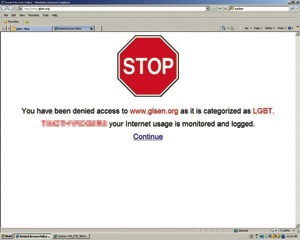
NEW YORK – The American Civil Liberties Union, the ACLU of Michigan and the ACLU of Kansas and Western Missouri have sent letters to public high schools demanding that the schools stop viewpoint-based censorship of web content geared toward the LGBT communities.
The ACLU was notified that the schools were censoring material after teaming with Yale Law School to launch the “Don’t Filter Me” campaign, which asked students to check to see if their school was blocking content.
“We’re pleased that students around the country are responding to the initiative by asserting their rights and letting their schools know that censorship is unacceptable,” said Joshua Block, staff attorney with the ACLU LGBT Project. “Blocking these sites not only discriminates against LGBT viewpoints, but can deny LGBT students in crisis a much-needed lifeline for support.”
Programs that block all LGBT content violate First Amendment rights to free speech, as well as the Equal Access Act, which requires equal access to school resources for all extracurricular clubs. This means that gay-straight alliances and LGBT support groups must have the same access to national organizational websites as other groups such as the Key Club and the chess club.
Some schools have also improperly configured their web filters to block news items pertaining to LGBT issues and deny access to support groups that could be vital for troubled LGBT youth who either don’t have access to the Internet at home, or do not feel safe accessing such information on their home computers.
Students who have responded to the “Don’t Filter Me” campaign include Nick Rinehart of Rochester High School in Rochester Hills, MI and Molly Mendenhall, of Oak Park High School in Kansas City, MO. The ACLU is also sending requests for information about web filtering programs to school districts in Alabama, Arkansas, California, Nevada, New Jersey, Pennsylvania, South Carolina, Texas, Wisconsin and Washington.
“I couldn’t believe my school would block access to perfectly legitimate websites just because they were about LGBT issues,” said Rinehart, who was blocked from looking up information on gay-straight alliances with a message that said his search violated Rochester High School’s “acceptable use” policy. “It’s not fair for the school to try to keep students in the dark about LGBT resources.”
“This is legitimate information that we need to know about,” said Mendenhall. “We need access to these sites to run our school clubs, to support each other and to understand current events. Schools shouldn’t be putting limits on our education.”
Some schools have improperly configured their web filters to block access to websites for LGBT rights organizations such as the Gay-Straight Alliance Network, the Gay, Lesbian and Straight Education Network and websites pertaining to the National Day of Silence to protest anti-LGBT bullying. However, the filters sometimes allow access to sites that condemn homosexuality or urge LGBT people to try to change their sexual orientation, such as People Can Change.
The ACLU has given the schools until April 4 to respond.










